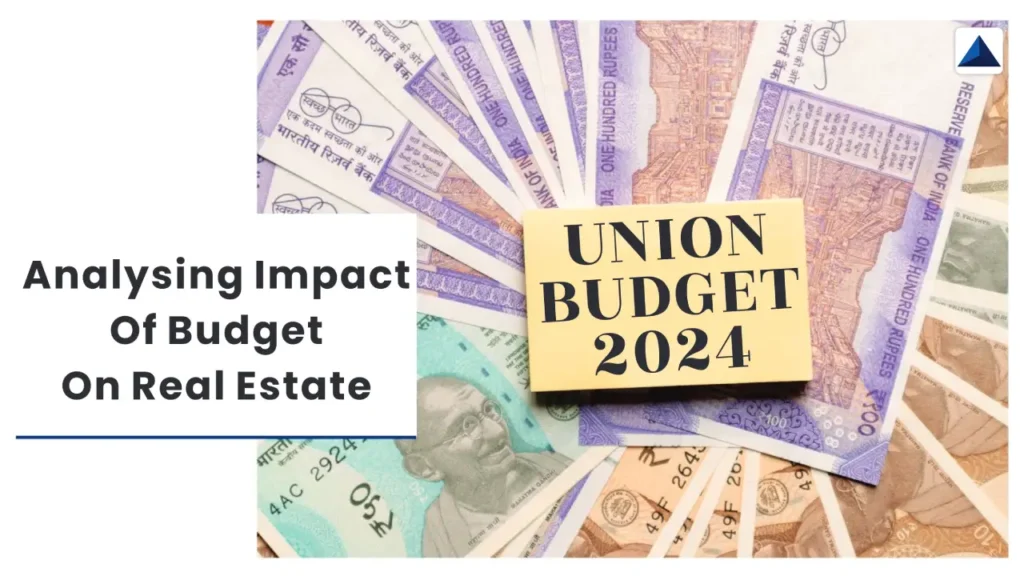- +91- 9899012036
- info@bsinfra.in

Introduction:
The Union Budget of 2024 in India has been eagerly anticipated, particularly by stakeholders in the real estate sector. As one of the key pillars of the economy, the real estate industry plays a significant role in driving economic growth, employment, and investment. With the unveiling of the budget, it is imperative to delve into its provisions and analyse how they will influence the trajectory of the real estate sector.

The Union Budget 2024 aims to provide a substantial boost to the affordable housing segment. The government has allocated significant funds towards initiatives such as Pradhan MantriAwasYojana (PMAY) to ensure housing for all by 2022. Tax incentives and subsidies are likely to be extended to developers and homebuyers in the affordable housing category, stimulating demand and supply in this segment.
Infrastructure development has always been closely intertwined with the real estate sector. The budget’s focus on infrastructure projects such as roads, highways, and metro rail networks is expected to enhance connectivity and accessibility, thereby driving demand for real estate in both urban and peri-urban areas. Increased investments in infrastructure can also lead to the development of new real estate hubs, opening up opportunities for developers and investors.
The rental housing market in India has been witnessing steady growth, fuelled by changing demographics and lifestyle preferences. The budget may introduce measures to incentivize rental housing, such as tax breaks for landlords and tenants. This could encourage more institutional investment in the rental housing segment, leading to the development of professionally managed rental properties and affordable rental options for urban dwellers.
The real estate sector has undergone significant regulatory reforms in recent years, including the implementation of RERA (Real Estate Regulation and Development Act) and GST (Goods and Services Tax). The Union Budget 2024 may introduce further reforms aimed at streamlining regulatory processes, reducing compliance burden, and promoting transparency in the sector. Simplification of approval procedures and land acquisition processes could improve ease of doing business for developers and attract more investments into the sector.
There have been long-standing demands from the real estate industry for granting infrastructure status to the sector. Such a designation would enable developers to access cheaper sources of funding, including long-term loans with lower interest rates. The budget may address this demand, providing a much-needed boost to the liquidity-starved real estate sector and accelerating the pace of project execution.
In line with global trends towards sustainability, the Union Budget 2024 may incentivize green building initiatives and sustainable development practices in the real estate sector. Tax benefits and subsidies could be provided to developers adopting environmentally friendly construction techniques and utilizing renewable energy sources. This not only aligns with the government’s environmental objectives but also enhances the marketability of real estate projects to eco-conscious buyers.
The COVID-19 pandemic has accelerated the adoption of digital technologies across industries, including real estate. The budget may allocate funds for the digitization of land records, online approval systems, and virtual property showcasing platforms. Embracing digital transformation can improve transparency, efficiency, and accessibility in the real estate ecosystem, benefiting both developers and homebuyers.
Conclusion:
The Union Budget 2024 holds significant implications for the real estate industry, with its provisions expected to shape the sector’s trajectory in the coming years. From incentivizing affordable housing and rental housing to promoting infrastructure development and regulatory reforms, the budget presents a comprehensive framework to revitalize the real estate sector and unlock its full potential as a driver of economic growth and development. Stakeholders in the industry must closely monitor the implementation of budgetary measures and adapt their strategies accordingly to capitalize on emerging opportunities and navigate potential challenges.